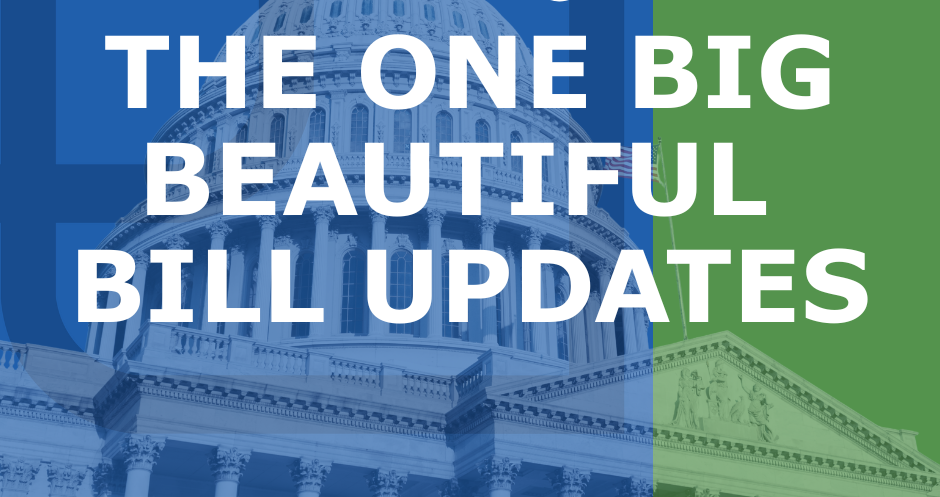Recent tax legislation, known as the One Big Beautiful Bill Act (OBBBA), has introduced important adjustments to the federal limitation on state and local tax (SALT) deductions—commonly referred to as the SALT cap—beginning with the 2025 tax year.
Combined with the ongoing availability of Pass-Through Entity Tax (PTET) regimes, these changes create fresh opportunities for tax planning, particularly for individuals and pass-through entity owners.

Expanded SALT Deduction Cap: Significant but Temporary Relief
Starting in 2025, the SALT deduction cap will rise substantially, increasing to $40,000 for single filers and married couples filing jointly, and to $20,000 for those married but filing separately. This new cap will not remain static; it is set to increase by 1% each year through 2029. For example, joint filers will see the cap grow to $40,400 in 2026, $40,804 in 2027, $41,212 in 2028, and $41,624 in 2029.
However, the relief is temporary. For tax years beginning after 2029, the SALT cap will revert to its previous $10,000 limit ($5,000 for married filing separately).
Phase-Outs for Higher-Income Taxpayers
The increased cap is not universal for all taxpayers. For those with higher incomes, the expanded cap will be gradually reduced. In 2025, the phase-out begins for joint filers with a modified adjusted gross income (MAGI) over $500,000 ($250,000 for married filing separately), with the thresholds increasing by 1% each year through 2029. The cap is reduced by 30% of the amount by which MAGI exceeds the applicable threshold, but the deduction cannot fall below $10,000 ($5,000 for married filing separately). For instance, a joint filer with $550,000 in MAGI during 2025 would see their SALT deduction cap reduced to $25,000.
What Counts Toward the Cap?
The deduction cap applies to the sum of state and local income taxes, real property taxes, and personal property taxes paid or accrued during the tax year.
Implications for Pass-Through Entity Tax (PTET) Regimes
In response to the original $10,000 SALT cap, many states—including Ohio, Kentucky, and Indiana —introduced PTET regimes. Under these arrangements, partnerships and S corporations can pay state income tax at the entity level, which is then deducted as a business expense for federal tax purposes. This allows business owners to bypass the individual SALT cap for their portion of state taxes paid by their entity.
The OBBBA does not impact the deductibility of PTET payments at the entity level. These payments remain fully deductible as a business expense, rather than as an itemized deduction for the individual owner. As a result, the increased SALT cap primarily benefits individuals who pay other state and local taxes directly, such as property taxes or state income taxes not paid through a PTET.
It’s important to note that taxpayers cannot double-dip: if you benefit from a PTET deduction at the entity level, you cannot also claim an individual deduction for the same taxes. The OBBBA doesn’t introduce any new restrictions or coordination rules between the expanded SALT cap and PTET deductions.
Practical Planning Considerations
Pass-through entity owners should continue to take advantage of PTET regimes as a valuable tool for maximizing federal deductions for state taxes. Meanwhile, individuals who incur significant state and local taxes outside of PTET structures stand to benefit from the higher SALT cap between 2025 and 2029, subject to the income-based phase-outs mentioned above. With the cap reverting to $10,000 after 2029, it remains important to plan ahead for future tax years.
Conclusion
The changes brought by the OBBBA offer temporary but meaningful tax relief for many, while PTET elections continue to provide a strong workaround for pass-through entity owners. Strategic planning will be essential to make the most of these opportunities and avoid potential pitfalls. If you have questions about how these updates apply to your unique situation, or you want to discuss how the SALT cap interacts with PTET elections, your Rudler, PSC advisor is here to help you navigate your tax planning with confidence.
Important: These are all new changes, and further guidance from the IRS and Treasury Department is expected. The details may change as new regulations and clarifications are issued. Be sure to consult with your tax advisor to understand how these changes affect your specific situation.
RUDLER, PSC CPAs and Business Advisors
This week's Rudler Review is presented by Evan Kandra, CPA.
If you would like to discuss your particular situation, contact Evan at 859-331-1717.

As part of Rudler, PSC's commitment to true proactive client partnerships, we have encouraged our professionals to specialize in their areas of interest, providing clients with specialized knowledge and strategic relationships. Be sure to receive future Rudler Reviews for advice from our experts, sign up today !